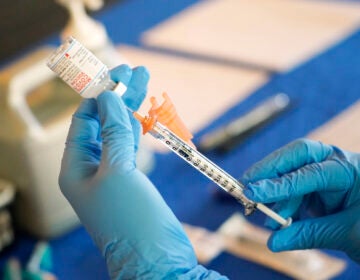Pa. early-childhood programs stretched to financial limit, study finds

Kristine Alvarez is associate director of consulting services at Nonprofit Finance Fund. (Kimberly Paynter/WHYY)
Common sense might suggest that the best early-childhood programs would do better financially.
But a new study finds that providers in Southeastern Pennsylvania have little fiscal incentive to reach for high quality.
A Nonprofit Finance Fund study of nearly 150 early-care and education programs in the Philadelphia area found that all of them – no matter their quality rating – operate on razor-thin margins.
So for operators, it’s more of a moral choice than a fiscal one to offer robust programming run by college-educated, certified teachers.
“There’s a lag between the resources required to support the provision of high quality and actually what it costs to do it. There’s an operating gap,” said Ann O’Brien, CEO of Montgomery Early Learning Center.
The center’s programs receive the state’s highest ratings – with locations in West Philadelphia, Point Breeze, Norristown and Pottstown.
The study found a year of early childhood programming in Southeastern Pennsylvania costs $12,000 on average, while the maximum state subsidy is $9,000.
To serve low-income parents, operators often struggle to bridge that gap through grants or higher fees for families who can afford them.
The existing funding model also makes it difficult for high-quality operators to attract and retain well-qualified teachers.
“Right now, our teachers earn, on average, about less than half of what their counterparts in public schools learn,” said O’Brien. “They work a full year. They work longer days. They have college degrees, but they earn significantly less.”
These issues can be alleviated only through a greater fiscal investment by policymakers and philanthropists, said Kristine Alvarez, Nonprofit Finance Fund lead researcher.
Increasing access to high quality pre-K will pay large dividends later on, she said, such as improving career academic performance and reducing the need for special education services – especially for the poor.
“We’re really trying to tackle those years that happen before kindergarten because so much happens in terms of the cognitive development, social development, and brain development of children before they turn 5,” said Alvarez.
That push for higher quality is complicated by the fact that parents know little about Pennsylvania’s pre-K rating system – giving low-performers little motivation to increase quality, she said.
The study was funded through a grant by the William Penn Foundation. It analyzed only data from the 147 nonprofit early childhood learning centers that already have established relations with the Nonprofit Finance Fund.
Of 1,890 state-certified early care and education programs in Philadelphia, just 177 are deemed high quality by Pennsylvania’s Keystone STARS rating system, offering 15,000 seats.
There are 100,000 children in Philadelphia under the age of 5.
WHYY is your source for fact-based, in-depth journalism and information. As a nonprofit organization, we rely on financial support from readers like you. Please give today.





